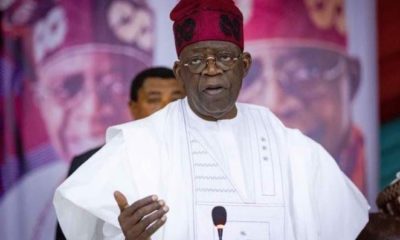Oil
Nigeria loses N5tn annually to oil theft, others

ABUJA-The Chairman and Chief Executive Officer, Nigerco Nigeria Limited, Mr. Yabagi Sani, on Wednesday called on the incoming administration of Muhammadu Buhari, to come up with policies that would help save the country annual operational losses of $25bn (about N5tn) from the oil and gas sector.
He said the losses were being incurred through crude oil theft and non-adherence to principles and standards as stipulated in the Weights and Measures Act.
Yabagi’s firm is currently implementing the legal metrology system in Nigeria on behalf of the Weights and Measures Department of the Ministry of Industry, Trade and Investment.
Addressing journalists in Abuja as part of activities to celebrate this year’s World Metrology Day, he said implementation of legal metrology in the oil and gas sector of the Nigerian economy would help reduce the massive corruption in the sector.
Yabagi said in view of the dwindling oil revenue from the oil and gas sector, strict adherence to principles and standards of weights and measures were fundamental for the growth of any economy.
However, he regretted that since 2013, there had been a lot of slack and ineffectiveness in the enforcement of the legal metrology law in the various sectors of the economy particularly the oil and gas sector.
Giving a breakdown of the $25bn, he said transactions at both the export and import terminals, which usually result in error margin of between three per cent and 17 per cent, could lead to an estimated loss of $7.47bn.
In the same vein, he said the sum of $17.4bn was being lost to crude oil theft.
Yabagi said, “Implementation of legal metrology in the oil and gas sector will establish the culture of rule of law in business transactions in this very vital sector of the economy.
“In view of the progressively dwindling revenue from oil and gas, strict adherence to the principles and standard of weights and measures practices are fundamental as inaccurate measurement system short-changes economies of revenue due to it.
“For instance, transactions at both the export and import terminals resulting in error margin of between three and 17 per cent can lead to an estimated loss of $7.47bn per annum.
“Concrete efforts by the incoming administration in the sector will, in practical terms, save Nigeria annual operational losses of $25bn made up of an estimated $7.5bn per annum attributable to the 10 per cent error margin, which is usually occasioned by indirect losses due to measurements not controlled by legal metrology, plus the annual crude oil theft of $17.4bn.”
He called on all regulatory agencies of government to assist the incoming administration by allowing full compliance with the implementation of the legal metrology system in Nigeria.
PUNCH-
Oil
NNPC Targets 60% Methane Emission Reduction By 2031
The Nigerian National Petroleum Company Limited (NNPC) has unveiled a bold strategy to reduce methane emissions in the oil and gas sector by 60% by 2031, with an ultimate goal of achieving net-zero emissions by 2060.
This announcement reinforces Nigeria’s leadership role under the Global Methane Pledge initiative and its commitment to tackling climate change.
The Group Chief Executive Officer of NNPC, Mele Kyari, disclosed these plans during a meeting on Thursday with Robert Leahman, the U.S. State Department’s Global Methane Program Manager, and a delegation from Deloitte.
READ MORE: Atiku Gloats Over AUN’s Achievements Ahead Of 20th Anniversary
The discussions, held at the NNPC Towers in Abuja, focused on collaborative efforts to reduce methane emissions through innovative and sustainable practices.
“Reducing methane emissions is not just an environmental necessity but also a strategic imperative for Nigeria’s energy transition. We are leveraging partnerships to adopt global best practices and innovative solutions,” Kyari stated.
Key among these efforts is a pilot project in the Niger Delta, aimed at establishing emissions baselines, mitigating methane leaks, and promoting sustainable operations across Nigeria’s energy sector.
The project, a partnership between NNPC, Deloitte, and the U.S. Bureau of Energy Resources, will utilize data-driven methodologies to pinpoint and address methane hotspots.
Robert Leahman commended Nigeria’s proactive stance, describing it as a benchmark for other nations on the continent.
“Nigeria’s leadership under the Global Methane Pledge sets a standard for the continent. These initiatives will not only help reduce emissions but also drive sustainable development in the energy sector,” he said.
Kyari highlighted the broader benefits of addressing methane emissions, noting its significance for both environmental protection and economic efficiency.
“This collaboration is a game-changer. By addressing methane leaks, we’re reducing waste, saving costs, and protecting the environment. It’s a win-win for our economy and the planet,” he added.
Oil
FG Introduces New Incentives To Revitalize Nigeria’s Oil & Gas Industry
In a strategic move to revitalize Nigeria’s oil and gas sector, the Federal Government has unveiled two key fiscal incentives aimed at attracting investment and enhancing energy security.
The announcement was made by Mr. Wale Edun, the Minister of Finance and Coordinating Minister of the Economy on Wednesday.
The first initiative, the Value Added Tax (VAT) Modification Order 2024, introduces critical exemptions for essential energy products and infrastructure, including Diesel, Feed Gas, Liquefied Petroleum Gas (LPG), Compressed Natural Gas (CNG), Electric Vehicles, Liquefied Natural Gas (LNG) infrastructure, and Clean Cooking Equipment.
Read Also: Atiku Calls For Rotational Presidency Across Nigeria’s Geopolitical Zones
These exemptions are designed to reduce living costs for Nigerians, promote energy security, and accelerate the transition to cleaner energy alternatives.
The second initiative, the Notice of Tax Incentives for Deep Offshore Oil & Gas Production, offers new tax relief options for deep offshore exploration projects.
This measure aims to position Nigeria’s deep offshore basin as a premier destination for international oil and gas investments, boosting the country’s appeal to foreign investors.
These reforms are part of a broader set of policy initiatives, known as Policy Directives 40-42, endorsed by President Bola Ahmed Tinubu.
The directives reflect the administration’s commitment to fostering sustainable development in the energy sector and enhancing Nigeria’s competitive edge in the global oil and gas market.
Business
Tinubu set to approve ExxonMobil-Seplat oil deal, expands CNG bus initiative

By Yemie Adeoye
NIGERIA’s President Bola Tinubu has announced that the protracted ExxonMobil-Seplat upstream oil divestment will be formally approved by the Minister of petroleum within a matter of days, just as he announced his government’s intention to expand the Compress natural Gas, CNG buses initiative.
The President who stated this during his Independence day nationwide broadcast stated that the move is in line with his administration’s commitment to free enterprise, free entry and free exit in investments which is the hallmark of his administration investment policy.
“Fellow compatriots, our administration is committed to free enterprise, free entry, and free exit in investments while maintaining the sanctity and efficacy of our regulatory processes. This principle guides the divestment transactions in our upstream petroleum sector, where we are committed to changing the fortune positively. As such, the ExxonMobil Seplat divestment will receive ministerial approval in a matter of days, having been concluded by the regulator, NUPRC, in line with the Petroleum Industry Act, PIA. This was done in the same manner as other qualified divestments approved in the sector.”
The President also seized the opportunity to plead with Nigerians to be patient with his administration’s reform policies. “As your President, I assure you that we are committed to finding sustainable solutions to alleviate the suffering of our citizens. Once again, I plead for your patience as the reforms we are implementing show positive signs, and we are beginning to see light at the end of the tunnel”.
“Our energy transition programme is on course. We are expanding the adoption of the Presidential Initiative on Compressed Natural Gas for mass transit with private sector players. The Federal Government is ready to assist the thirty-six States and FCT in acquiring CNG buses for cheaper public transportation.
Fellow Nigerians, while we are working to stabilise the economy and secure the country, we also seek to foster national unity and build social harmony and cohesion. Our economy can only thrive when there is peace”. he enthused.




















